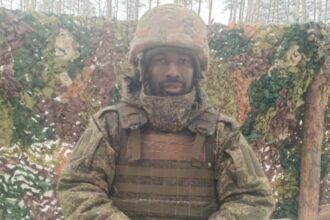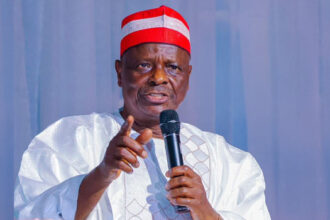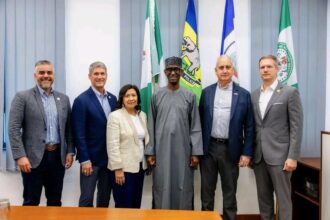
President of the United States, Donald J. Trump, has raised global attention to what he described as the “existential threat” facing Christianity in Nigeria, warning that the United States “cannot stand by” while such atrocities continue unchecked.
In a powerful statement posted on his official Truth Social account on Monday, Trump declared that the United States must act decisively to protect Christians being targeted across the world, particularly in Nigeria, where thousands of believers have been killed in religiously motivated violence over the past decade.
“Christianity is facing an existential threat in Nigeria,” Trump wrote. “The United States cannot stand by while such atrocities are happening there, and in numerous other countries. We stand ready, willing, and able to save our great Christian population around the world!”
Related posts:
- President Donald Trump declares Nigeria a “Country of Particular Concern,” cites mass killings of Christians
- President Trump orders Pentagon to prepare for possible military action in Nigeria over Christian genocide
- Senator Ted Cruz: Trump administration knows those behind Christian massacres in Nigeria
- Congressman Moore introduces resolution condemning the persecution of Christians in Nigeria
The post has since gone viral, sparking a wave of reactions from human rights groups, religious organizations, political analysts, and the Nigerian government. Within hours of Trump’s statement, global media outlets began reporting renewed focus on the crisis of religious persecution in Africa’s most populous nation.
Trump’s declaration marks one of the strongest condemnations yet by a former U.S. president regarding the ongoing violence against Christians in Nigeria, which international watchdogs such as Open Doors, the U.S. Commission on International Religious Freedom (USCIRF), and Amnesty International have long described as alarming and systematic.
According to multiple reports, more than 50,000 Christians have been killed in Nigeria since 2009, with over 18,000 churches and 2,000 Christian schools destroyed by Islamist extremists, including Boko Haram, Islamic State West Africa Province (ISWAP), and armed Fulani militias. Despite repeated appeals from international advocacy groups, successive Nigerian administrations have been accused of failing to adequately protect vulnerable communities in the Middle Belt and Northern regions.
Trump’s post appears to echo recent remarks by U.S. Senator Ted Cruz, who alleged that specific individuals within Nigeria’s political and security establishment were responsible for decisions that have enabled the ongoing violence. Cruz, alongside several Republican senators, has been pushing legislation to redesignate Nigeria as a “Country of Particular Concern” (CPC) — a classification reserved for nations that engage in or tolerate severe violations of religious freedom.
In 2020, under the Trump administration, the U.S. State Department first designated Nigeria a CPC, citing systematic attacks on Christian communities and the government’s failure to prevent or punish the perpetrators. However, the Biden administration controversially delisted Nigeria in 2021, a decision that drew heavy criticism from U.S. lawmakers, church leaders, and advocacy groups.
Trump’s latest remarks suggest that, if returned to power, he would likely reinstate the CPC designation and potentially impose sanctions on Nigerian officials implicated in religious persecution.
Shockwaves Across Nigeria
Trump’s statement immediately drew mixed reactions in Nigeria. While many Christian organizations and rights advocates welcomed his comments as “long overdue,” others accused him of oversimplifying a complex conflict that is also driven by terrorism, poverty, ethnic tensions, and competition for land and resources.
The Christian Association of Nigeria (CAN) issued a cautious statement acknowledging the “moral weight” of Trump’s message but warned against any foreign intervention that could further polarize the country.
“We appreciate any global voice that highlights the suffering of Christians in Nigeria,” CAN President Archbishop Daniel Okoh said. “However, we also call for constructive engagement, not confrontation. Nigeria must address these issues through justice, dialogue, and reform.”
In contrast, the Supreme Council for Islamic Affairs (NSCIA) criticized Trump’s statement as “inflammatory” and “politically motivated,” accusing him of exploiting religious divisions for international attention.
“The conflicts in Nigeria are not about religion alone,” the NSCIA said in a press release. “They involve criminality, banditry, and terrorism affecting all Nigerians, Muslims and Christians alike.”
Nigerian Government Responds
The Nigerian Presidency also reacted swiftly, rejecting Trump’s characterization of events in the country. In a statement issued by presidential spokesperson Ajuri Ngelale, the government insisted that Nigeria remains committed to religious freedom and equality under the law.
“President Bola Tinubu’s administration does not and will never tolerate any form of religious persecution. Every Nigerian, regardless of faith, is protected by the Constitution,” Ngelale stated. “We urge international partners to approach this issue with sensitivity, accuracy, and context.”
The Defence Headquarters also dismissed Trump’s remarks, calling them “an overstatement not supported by verified intelligence.” The military claimed that ongoing counterterrorism operations in the North East and North Central regions are “making significant progress” in neutralizing threats to all communities.
Despite the government’s rebuttal, Trump’s statement has reignited both domestic and international scrutiny of Nigeria’s human rights record, particularly its handling of religiously targeted violence.
Global Reactions and Political Implications
Trump’s comments have resonated widely among American evangelical circles, who have long championed the cause of persecuted Christians abroad. Prominent U.S. religious leaders and conservative commentators have applauded his statement, urging Washington to take stronger diplomatic and economic action.
“President Trump is right — what’s happening in Nigeria is a Christian genocide,” said Franklin Graham, president of Samaritan’s Purse. “The U.S. must not remain silent when believers are being slaughtered for their faith.”
Political observers, however, see Trump’s intervention as both a moral and strategic move as he seeks to bolster his foreign policy credentials ahead of the 2026 U.S. midterm elections and potential 2028 campaign. His firm stance on global Christian persecution may strengthen his appeal among conservative voters and faith-based groups that played a key role in his previous campaigns.
Human Rights Advocates Welcome Renewed Attention
For many human rights organizations, Trump’s statement offers an opportunity to revive global attention to a crisis that has, in their view, faded from the international spotlight.
The International Society for Civil Liberties and Rule of Law (Intersociety), a Nigerian rights group that tracks violence against Christians, praised Trump’s “bold leadership,” claiming that his words could pressure both Nigerian and U.S. authorities to take action.
“We have documented more than 50,000 killings since 2009,” said Intersociety’s chairman, Emeka Umeagbalasi. “If the U.S. leads with sanctions and accountability, it could finally stop this bloodshed.”
A Call for Accountability and Reform
Trump’s message also poses a diplomatic test for the Tinubu administration, which is working to strengthen relations with Washington amid growing security and economic challenges. Analysts say the Nigerian government must now demonstrate measurable progress in protecting vulnerable populations, prosecuting perpetrators, and addressing underlying grievances.
Dr. Chika Eze, a political analyst based in Abuja, told reporters that Trump’s words “will put Abuja under renewed global watch.”
“When a former U.S. president says Christianity is facing an existential threat, it resonates far beyond social media. It becomes a policy talking point in Washington and a diplomatic pressure tool,” Eze said.
As reactions continue to pour in, Trump’s post has reignited debate about faith, freedom, and global responsibility. Whether his call to action leads to concrete policy measures remains to be seen, but his statement has undeniably shifted the world’s gaze back to Nigeria’s embattled Christian communities.
For millions of Nigerian Christians who have endured years of violence and displacement, the hope is that this renewed attention will translate into lasting protection and justice — not just rhetoric.
As one pastor in Plateau State told a local radio station,
“If America speaks, maybe our leaders will finally listen. We just want peace, not politics.”






